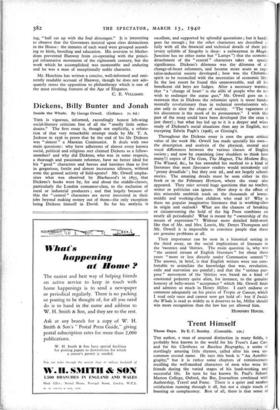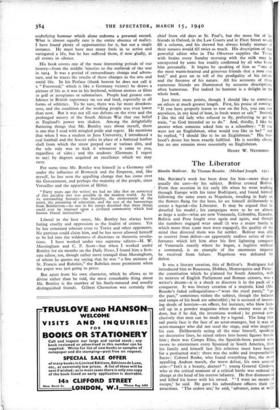Trent Himself
Those Days. By E. C. Bentley. (Constable. rzs.)
THE author, a man of unusual distinction in many fields, is probably best known to the world for his Trent's Last Case and for his Clerihews or Baseless Biography, a series of startlingly amusing little rhymes, called after his own un- common second name. He says this book is " An Autobio- graphy," but it is rather some chapters of reminiscences recalling the well-marked characters of men who were his friends during the varied stages of his hard-working and successful life. In turn he has known St. Paul's School, Merton College, Oxford, the Bar, Journalism combined with Authorship, Travel and Fame. There is a quiet and modest satisfaction running through it all, bit not a single touch of boasting or-- complacency. Best of all, there is that sense of
underlying humour which alone redeems a personal record. What is almost equally rare is the entire absence of malice.
I have found plenty of opportunities for it, but not a single instance. He must have met many fools in so active and variegated a life, but he has suffered them, if now gladly, at all events in silence.
His book covers one of the most interesting periods of our history—from the middle 'nineties to the outbreak of the war in 1914. It was a period of extraordinary change and adven- ture, and he traces the results of these changes in the arts and social life. In his Preface (thank heaven he does not call it a " Foreword," which is like a Germany victory) he draws a picture of life as it was in his boyhood, without motors or films or golf or aeroplanes or submarines. People had greater con- fidence in British supremacy on sea and land, especially in all forms of athletics. To be sure, there was far more drunken- ness, and the condition of the working people was even lower than now. But it was not till our defeats on the river and the prolonged misery of the South African War that our belief in England's power was shaken. Among the delightfully flattering things that Mr. Bentley says about myself, there is one that I read with mingled pride and regret. He mentions that when I was a student in Jena University, I introduced a real football and the Soccer rules in place of a battered leather shell from which the straw peeped out at various slits, and the sole rule was to kick it whenever it came to you, regardless of sides ; and the students (Germans I regret to say) by degrees acquired an excellence which we may envy.
For some time Mr. Bentley was himself in a Germany still under the influence of Bismarck and the Emperor, and, like myself, he has seen the appalling change that has come over the Government, and perhaps the majority of the people, since Versailles and the apparition of Hitler. •
"Forty years ago (he writes) we had no idea that an autocracy of this peculiar sort was possible in the modern world. As for its outstanding features—the brutality, the enslavement of the mind, the poisoning of education, and the rest of the borrowings from Bolshevism—no one in his senses dreamed that these things could ever be imposed upon a civilized community which had known liberal institutions."
Liberal in the best sense, Mr. Bentley has always been hating cruelty and oppression as the foulest of crimes. Yet he has remained tolerant even to Tories and other opponents.
No partisan could claim him, and he has never allowed himself to be led into the wilderness of doctrines or theoretic revolu- tions. I have worked under two supreme editors—H. W. Massingham and C. P. Scott—but when I worked under Bentley for six months on the Daily News, I found him a first- rate editor, too, though rather more tranquil than Massingham, of whom he quotes my saying that he was " a fine mixture of St. Francis and Rabelais," the Rabelais more prominent when the paper was just going to press.
But apart from his own character, which he allows us to divine rather than be told, the moat remarkable thing about Mr. Bentley is the number of his finely-natured and usually distinguished friends. Gilbert Chesterton was certainly the
chief from old days at St. Paul's, but the mere list of his friends in Oxford, in the Law Courts and in Fleet Street would fill a column, and his shrewd but always kindly account of their natures would fill twice as much. His description of that powerful editor who in The Observer supplies the Tories with brains every Sunday morning with the milk may be unexpected by some but readily confirmed by all who know him personally. It begins by speaking of him as "one of the most warm-hearted and generous friends that a man ever had," and goes on to tell of the prodigality of his talents and the fineness of his nature. All his accounts of these numerous friends are illuminated by accurate descriptions, often humorous. For indeed its humour is a delight in the whole book.
Just three more points, though I should like to comment on others at much greater length. First, his praise of rowing: " If you have properly learnt to row on the Isis, you can row anywhere, in any kind of boat, in fresh water or salt." Second, I like the old lady who refused to fly, preferring to go by train, " as God intended us to do." And, thirdly, I like his answer when someone asked him as a schoolboy : " If you were not an Englishman, what would you like to be? " and he replied, " I should like to be an Englishman." His boy- hood's desire has been exactly fulfilled. He is terribly clever, but no one remains more essentially an Englishman.
HENRY W. NEVINSON.























































 Previous page
Previous page